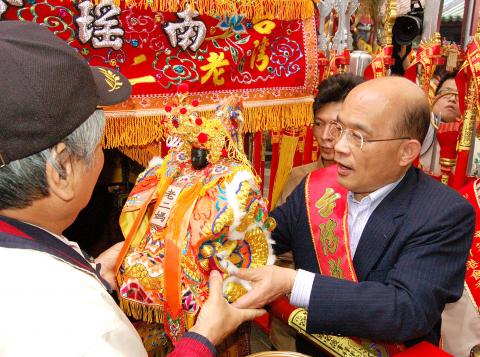In remarks certain to rankle with the Democratic Progressive Party (DPP), democracy activist and former party chairman Shih Ming-teh (施明德) yesterday accused the party’s two frontrunners for presidential candidate of “lacking leadership material.”
In a meeting with Hsu Hsin-liang (許信良) at Shih’s residence in New Taipei City (新北市), Shih endorsed Hsu, who is trailing heavily in the primaries. Shih and Hsu were key players 30 years ago in Taiwan’s fledging democracy movement that eventually led to the creation of the DPP.
“Hsu is far-sighted and the ideal candidate for president,” said Shih, who was DPP chairman between 1994 and 1996.

Photo: Tang Shih-ming, Taipei Times
Hsu, who headed the party in 1993, raised his profile with remarks in support of closer cross-strait ties during the first two DPP policy sessions with Tsai Ing-wen (蔡英文) and Su Tseng-chang (蘇貞昌), the top contenders for the party nomination.
“Hsu knows the problems Taiwan is facing today,” Shih said. “He has forced Tsai and Su to respond to tough questions on cross-strait issues and the Economic Cooperation Framework Agreement.”
The two were involved in the street protests that led to the Kaohsiung Incident in 1979, recognized as a democratic milestone for the nation. Shih served a 10-year sentence while Hsu fled abroad, where he continued to publish pro-Taiwan articles.
However, the pair have a turbulent history with the party, giving up their membership during Chen Shui-bian’s (陳水扁) administration. Shih later led hundreds of thousands in street protests in Taipei against alleged corruption by Chen.
Shih said both Tsai and Su did not play any key roles in Taiwan’s democracy movement in the 1970s and 1980s. Not a “single one” of the key democratic trailblazers, such as himself, later assumed high-level government roles, he said.
“I know that one day, perhaps in a 100 years, history will remember us over people like presidents Ma Ying-jeou (馬英九), Chen Shui-bian and Lee Teng-hui (李登輝),” he said.
“After watching [Wednesday’s] debate ... I feel that while Su might be a good minister or mayor, I don’t think he has what it takes to be president,” Shih said.
Responding to the comments, Lee Hou-ching (李厚慶), a campaign spokesperson for Su — who was a lawyer for the defendants in the Kaohsiung Incident — said Su “expressed his gratitude for the advice,” but refused to elaborate.
Shih said Tsai was still “too unknown and unfamiliar. She’s only been in the DPP for seven years.”
At a separate setting later in the day, Shih called on Tsai, who is single, to clarify her sexual orientation, saying voters deserved “a clear answer” before voting her.
Tsai’s campaign office was unavailable for comment.
Shih and Hsu denied that they were aligned with the Chinese Nationalist Party (KMT).

Alain Robert, known as the "French Spider-Man," praised Alex Honnold as exceptionally well-prepared after the US climber completed a free solo ascent of Taipei 101 yesterday. Robert said Honnold's ascent of the 508m-tall skyscraper in just more than one-and-a-half hours without using safety ropes or equipment was a remarkable achievement. "This is my life," he said in an interview conducted in French, adding that he liked the feeling of being "on the edge of danger." The 63-year-old Frenchman climbed Taipei 101 using ropes in December 2004, taking about four hours to reach the top. On a one-to-10 scale of difficulty, Robert said Taipei 101

A preclearance service to facilitate entry for people traveling to select airports in Japan would be available from Thursday next week to Feb. 25 at Taiwan Taoyuan International Airport, Taoyuan International Airport Corp (TIAC) said on Tuesday. The service was first made available to Taiwanese travelers throughout the winter vacation of 2024 and during the Lunar New Year holiday. In addition to flights to the Japanese cities of Hakodate, Asahikawa, Akita, Sendai, Niigata, Okayama, Takamatsu, Kumamoto and Kagoshima, the service would be available to travelers to Kobe and Oita. The service can be accessed by passengers of 15 flight routes operated by

Taiwanese and US defense groups are collaborating to introduce deployable, semi-autonomous manufacturing systems for drones and components in a boost to the nation’s supply chain resilience. Taiwan’s G-Tech Optroelectronics Corp subsidiary GTOC and the US’ Aerkomm Inc on Friday announced an agreement with fellow US-based Firestorm Lab to adopt the latter’s xCell, a technology featuring 3D printers fitted in 6.1m container units. The systems enable aerial platforms and parts to be produced in high volumes from dispersed nodes capable of rapid redeployment, to minimize the risk of enemy strikes and to meet field requirements, they said. Firestorm chief technology officer Ian Muceus said

MORE FALL: An investigation into one of Xi’s key cronies, part of a broader ‘anti-corruption’ drive, indicates that he might have a deep distrust in the military, an expert said China’s latest military purge underscores systemic risks in its shift from collective leadership to sole rule under Chinese President Xi Jinping (習近平), and could disrupt its chain of command and military capabilities, a national security official said yesterday. If decisionmaking within the Chinese Communist Party has become “irrational” under one-man rule, the Taiwan Strait and the regional situation must be approached with extreme caution, given unforeseen risks, they added. The anonymous official made the remarks as China’s Central Military Commission Vice Chairman Zhang Youxia (張又俠) and Joint Staff Department Chief of Staff Liu Zhenli (劉振立) were reportedly being investigated for suspected “serious